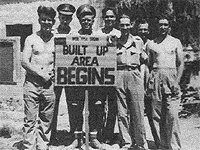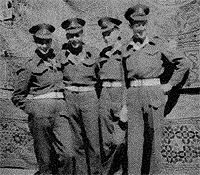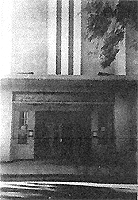ROYAL MILITARY POLICE - 1945-48
As Remembered By Bill Perrett
My service really started with a nine month stint in the coal
mines, ahead of joining the Army. It was common practice at that time for those
being called up to be balloted for work in the UK coalmines. I was one of those
with little choice and duly despatched to the Newcastle area. What occurred
during that period in the pit is another story, suffice to say I managed to
get out, but still had to complete my time in the forces.
A limited choice in the Army was between the infantry or police. I selected
the Redcaps.
On a cold November morning in 1944 I journeyed north from London towards the
Green Howards base at Richmond Barracks in Yorkshire, for the 8 week army training
prior to my posting to the Police in Surrey, where I stayed a few months. I
then joined others to cross the Channel and go the south of France by train
towards Toulouse, our point of embarkation. During that train journey, I witness
the horrors and desolation very apparent from heavy battles of a European War
that had just ended.
The few days across the Mediterranean soon passed and, as we neared Port Said,
a horrible odour wafted across the sea towards me. Not experiencing such a foul
smell before it immediately hit me. We were then several miles off-shore; what
could I expect when we docked?
The next few days were sketchy. It was another world when months ago Rommel
was poised to invade the whole of Egypt. I don’t remember any discomfort
as we moved on to Cairo, bearing in mind it had been no picnic for millions
of us.
Our base in central Cairo was Bab-el-Hadid barracks, a stone throw from the
main rail-way station. The sleeping quarters were across the road from the main
admin area, where we were housed in a six storey block of flats. I well remember
suspicious characters that lurked around our entrance, even shoe cleaning boys
were touting for business as we approached our notorious block.
When I look back on those chancy days something else shook me when I was introduced
to the hole in the floor toilets! Sanitation in Cairo was decidedly sparse.
As the months passed I was to be confronted with regular visits to an Arab privy;
some were ghastly!
I had settled on the top floor where I found a metal bedstead and three ‘biscuits’
which formed the complete mattress. A blanket was sufficient to cover you, though
there was a problem; roaming cockroaches!! To deter these creatures round tins
had been placed under the bed supports and filled with paraffin. That discouraged
the devils, although they got over that by moving up the walls to drop on the
beds!!
Giving the exterior a look over I found the adjacent buildings shared a large
cavity in the middle, supposedly a garden? But it wasn’t, it was a huge
tip of rotting mounds of questionable rubbish. People were even living down
there in tent-like areas. The real source of our infestation was obviously coming
up from the appalling mess below.
It was soon time for real police work. and this involved patrolling the streets
of Cairo on foot purely to ensure our Service personnel were behaving themselves.
It did not take long to realise we were not really welcome by the local people;
the war over, and they wanted us gone.
However we remained for the time being, although King Farouk’s position
was coming under pressure from some of the generals in the Egyptian Army. In
fact, when he would visit the city centre on those occasions there would be
a fleet of Red Harley Davison’s Jeeps, and Limo’s in attendance.
In one of those lavish cars he would sit back, apparently no one knew which
car he would be in? There was an evening when he decided to visit the cinema
and that night I was on duty across the road from the theatre. He appeared with
the usual aides, sporting a Fez and suiting in a uniform adorned with medals.
His large brown face shone from the regular use of oils, while he was greeted
by his hosts before disappearing inside.
A different and somewhat strange regular outing was something else. It was
labelled an International Patrol, comprising an Egyptian Army or Police Major;
a local policeman dressed in a long black coat and sporting the usual Fez. Then
one of us Military Police, and an RASC driver. The Policeman did not speak or
move from the Jeep during the whole evening shift, which lasted from 8 in the
evening until around 3 in the morning.
The driver and I would start our journey from the Cairo barracks, and then
collect the officer and his local copper, usually at the nearby Police Station.
As Egyptian nationals may be involved with any of our people as we drove to
the city, it was essential they were on board. There were certain perks to be
had on these patrols, one such was at the busy Africa Bar near city centre.
We would pull up outside the premises and remain seated. Within moments a waiter
would appear with a tray of three drinks. The unfazed police constable did not
move or accept any refreshments.
Bearing in mind not many months before there were thousands of troops in the
area of Cairo going up to the front line, so not knowing what their future was
they had made the most of their visit to the Egyptian capital, generally having
a good time as well as enjoying the local girls. There had been some mayhem
on occasions before with the Americans and other nation’s troops as well
as our personnel. The clubs and bars always needed the military and local police
to swiftly assist, particularly when they were being broken up by drunken soldiers.
The rewards for any police were much greater then apparently, but those times
were no more.
Perhaps one of the most memorable patrols for me was our regular visits to
the official brothel, on duty of course!! Field Marhsall Montgomery had earlier
declared these places “out of bounds” to our troops, so we had to
patrol the notorious Berker area which comprised of a huddle of controlled houses.
The girls there were officially licensed and regularly checked by civilian medical
authorities. It was a busy area where Egyptian men would queue for their turn.
I would smile when we entered these places to see the ‘clients’
waiting as if in a doctors surgery!
Some of the “staff” were Greek girls, and beautiful. We would stroll
around unhindered in the flat roofed houses, and keep an eye. Naturally we would
have respect so as not to disturb the regulars, we knew who we were looking
for.
Occasionally our people would be spotted moving secretly from house to house.
I remember chasing a serviceman through a property where a girl’s parents
were sitting unconcerned in their bed. Reaching the flat roof, I cornered the
serviceman who was dressed in an RAF uniform, he was handed over to the RAF
police. One interesting occasion Mac and I entered a house we had not bothered
with before. It had palatial stairs that appeared beyond the main double doors.
There was the usual commotion as we entered from a “madam”, who
came from nowhere to loudly declare there were no English there. I glanced towards
the two rooms above, then nodded to my colleague before we moved sharply up
the carpeted stairs. Shouting then erupted from the woman in charge as panic
set in from the room on the left. I pushed open the door and walked in to find
a naked girl on a large untidy bed. Then my attention was drawn to a wobbling
wardrobe where an army jacket was hanging down. Three brass pips on the shoulder
indicated a commissioned officer, who we could not “arrest”. We
called our duty officer from the radio truck, who appeared quickly. That was
apparently the end of the matter!
Being received by the ‘girls’, one afternoon we were invited to
take a meal with them. This was outside in a garden area when several of the
family sat down with a large dish of food placed on the centre of the table.
We were given a small bowl to finger our food from the main dish; there were
no forks or spoons.
We, of course, were not ‘customers’, though the relationship that
developed with frequent patrols was happy and helpful. I remember being taken
short one day and before I went to the notorious “Hole in the ground”,
one of the girls produced a roll of toilet paper. She pulled off several sheets
and passed them over to me with an understanding smile.
An occasional visit by our Sergeant was a nod and a wink! He would arrive and
quite simply pass over a packet of 20 Craven-A cigarettes to his favourite girl.
“Keep an eye out chaps” he would say before disappearing to the
bedroom!!
Many years have passed since those colourful times as my rolling memory picks
up to reflect on an incident, of which there were many. One such – it
was customary to return the Egyptian officer to his home in the small hours
when the motorised patrol was over, and travel through the often strange and
gloomy back street of old Cairo. We would end up at unlikely homesteads set
in a purple haze or near darkness, when I would shiver at the thought of living
among such macabre desolation like found in the Hollywood horror films.
The day came when the British Army left Cairo for good, some troops locating
to the Canal Zone away from the capital. The Military Police and others were
relocated over the international border of Palestine. A country with difficulties.
Palestine Police looked after the populous, we where, of course, were concerned
with the Military.
While I could not comment the real issues, it was not easy as we entered a
country with hostile elements of terrorism.
We were firstly under canvas just outside Gaza, where I was concerned with
others in policing and route signing for troop movements throughout the country.
There was always a funny side to our time anywhere with difficulties. The Carpentry
& Paint shop produced signs to easily route the military vehicles through
our area of the middle-east. The large signs we erected would regularly vanish
overnight! With the shortage of sheet steel we had to “hammer” corrugated
iron flat to create these signs, it took time.
Apparently, Bedouin’s were responsible. They would use several of these
signs to make a suitable roof, or fence out in their desert hideaways?
Decisive memories emerge when in years to come you home in on that time of
life, and again, it can raise a noticeable smile. We had an issue with the main
toilet block by the garage workshops; it was infested with cockroaches! It was
agreed all waste oil, cleaning fluid and suchlike be disposed of down the deep
concrete toilet well to hopefully kill them off. It seemed to do the trick,
but we were still cautious when using the privy as these creatures were known
to rest under the toilet seat!
I had minutes before used the facility when all of a sudden there was a loud
bang. A cloud of smoke along with sundry debris floated through the air, when
several of us rushed to assist. It transpired one of our men about to use the
toilet had struck a match to make sure it was clear of the infestation. Apparently
the lethal toxic vapours hovering below had exploded, and shifted the solid
concrete emplacement some five inches! Walls of the toilet area were splatter
with cockroaches and paper etc. Our colleague who had sought to attend the call
of nature got off with the loss of his eyebrows! A similar problem at the officer’s
block was dealt with by pouring pure petrol down to deal with the issue quickly.
Their toilet was blown out of the ground!
As we had the beach and gentle sea nearby, many of us would swim in the early
morning. That was before more terrorist activity began in earnest when they
bombed The King David hotel in Jerusalem, with loss of life. Then two Army sergeants
were savagely murdered, with their bodies hung in an orange grove. Around that
time the ship Exodus, bound from Europe, being packed with people wanting to
settle in Palestine, arrived off shore at Gaza. The British Government refused
the captain of the well loaded vessel permission to land anyone ashore. There
was a stand-off when several passengers decided to jump ship, but as far as
I know they were returned aboard. Hours before that we were roused from our
sleep and given a rifle with 6 rounds. We were lined up at intervals by the
water’s edge and told to stop anyone coming ashore. To this day I wonder
what would have happened if anyone had landed; would we have fired?
Many place were “Out of Bounds” to troops. Tel-Aviv particularly
being a town to steer clear of. One morning three of us were on a local patrolling
villages, when we saw two soldiers window shopping. I pulled up near the puzzled
men, called them over and asked what they were doing there as it was “out
of bounds”. They had apparently got a lift into the small town as they
were off duty. They did not have a clue about the danger. When I suggested they
look above the nearby houses where Arab types were observing them and suitably
armed! They turned green. We returned them to their unit without any charges,
they had learned quickly that morning.
After that tension prevailed until it was time to leave the country, weeks
before the UN took over from the UK on the 14th May 1948. We were sent to Haifa
to await our return home. It was very cold during those weeks waiting for the
troop ship to dock while staying in dilapidated barracks. We wrenched any timber
from old living quarters to use as fuel to burn on the dormitory stove. It was
dismal.
Many of us were going to Liverpool for demob, some with still time to serve
went on to Kenya to deal with the political difficulties in the country. The
ship Franconia eventually sailed into harbour when we were at last pleased to
board the vessel, and leave an area of the middle-east in political turmoil.
That period came to an end as I reflected on the recent years of war, the coalmines
and the army with all the difficulties, I had grown up fast during those twenty
years of strife and discovery.

Team of Painters & Carpenters – Palestine
Fraser, Perrett, Hank (Sgt Wood) Wilson, Mansfield, Woodbridge &
Harrington
|

Ushers for Gezira Sporting Club – Cairo
Newton, Richardson, Brainch & MacMillan
|
Garrison Cinema -
Sarafand near Tel Aviv
|
Back to Gallery Bill
Perrett
Back to RMP
Back to Army Units
Back to Canal Zoners
Memories
Back to Main Page


